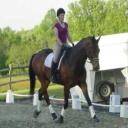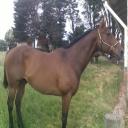Yahoo Answers is shutting down on May 4th, 2021 (Eastern Time) and beginning April 20th, 2021 (Eastern Time) the Yahoo Answers website will be in read-only mode. There will be no changes to other Yahoo properties or services, or your Yahoo account. You can find more information about the Yahoo Answers shutdown and how to download your data on this help page.
Trending News
What to do with my horse?
A little background: I lease a horse that's owned by the barn where I take lessons. From what I have heard, he has had pretty bad feet his whole life and might be somewhat navicular. When I started riding him, he wasn't being ridden regularly by anyone, but was absolutely wonderful to ride. He was always very willing and made an obvious effort to do everything I asked him, even though he wasn't in the best physical shape (he could barely hold a canter for a whole circle!)
His original owners had trained him for reining and fitted him with shoes that were too small, which I'm sure has something to do with his problems, but when I started riding him he was wearing special shoes that had the undesired effect of making him break over really early and causing a really short stride. So, last summer his owner suggested to me that we switch him over to natural hoof care. I knew he would be out of commission for a while, but it seemed like it would be better for him in the long run.
He was sore for quite a while as he got used to the new angle of his feet, and in November it seemed like he was almost all better again. However, since then he seems to have gotten worse again. He always seems a bit stiff, moreso going to the right than to the left, and bucks when I ask him to canter (while riding or on the ground in the round pen). When I first started riding him, he would very rarely give a small buck when you asked him to do something challenging, but the last few weeks it's been every ride and even on the ground.
He's been looked at multiple times by the trimmer and vet, and he gets occasional treatments from a chiropractor, but they haven't found any reason for his behavior. The owner has mentioned that we might consider putting some regular shoes back on him (not like the corrective shoes he had before)
What do you guys think? I really like this horse and would hate to have to start over again with some other horse in the barn.
@Ang - I'm afraid you're probably right, I just wish there were something I could do for Smokie...
@OTTB - I don't think that's the problem in my case, but it's always a good thing to check. Smokie did need his teeth floated pretty badly a short while after I started riding him and I could definitely tell that something was wrong with him from his behavior then (even though I didn't know exactly what the problem was, since I've never had to get a horse's teeth floated before- I could tell it was something with his mouth) In this case, I'm pretty sure it's hoof/leg/shoulder related.
I guess I didn't say it explicitly, but he needed his teeth floated and it was done. If he has any dental issues now, it's not related to needing floating.
He did wear little boots similar to the Easy Care Glove Boots when he was transitioning, but he no longer needs them, as it's been about 8-9 months since the switchover.
Investigating going with another trimmer is a bit tough since I'm not the owner and therefore not the one paying for it. I will, however, bring it up with the owner and see what she has to say.
6 Answers
- AngelaLv 61 decade agoFavorite Answer
I'm all for barefoot when the situation calls for it, but it may be that the corrective shoeing is just what he needed. Shoes or a trimming method that helps the horse to break over easier is exactly what is called for when a horse has navicular. And navicular disease causes a horse to have a short stride. The heel pain they feel is what makes them shorten their stride. So maybe you were blaming the corrective shoes for the short stride when that wasn't the case. I'm only suggesting you consider going back to the corrective shoes because it sounds like removing them made his pain worse. Sure it seemed for a little bit like he was better because you backed off his workload while he adjusted to the new angle of his feet, but when you started working him more he's showing severe signs of pain. Unless your vet had done an MRI to really see what's going on in the navicular area, simply having your vet "look at" him can't tell you if the navicular disease is worse. But navicular disease is progressive. It will not get better, only worse. You can take steps to manage the pain and make the horse useful for a while, but eventually the horse will be in too much pain to be ridden hard, then eventually at all.
To be honest I think the horse is trying to tell you he's in pain. You can feel the stiffness, and I think the bucking is his way of telling you that he hurts. To be honest I would start all over with another horse that is sound. If you keep working with this horse, you'll only get more attached and it's not worth it. It's not fair to the horse or you. I know it's terrible to give up on a horse you love, but it may be the best thing for both of you. I've been there, and I sympathize. Trust me, I know how you feel.
- FinleyLv 71 decade ago
If his teeth were bad, they need to floated asap, that can be the issue and it might just be a coincidence that he's now started bucking with bare feet. A teeth issue can cause a horse to buck and act up from the pain.
As for barefoot.....there are a lot of people calling themselves trimmers, but they really are not that educated. If yours was you'd of been told about using Easy Care Glove Boots for the transition.
All good trimmers carry these and will tell you about them and based on his history, would probably insist on using them.
I'd find a real barefoot trimmer and get a real assessment.
If the vet did an X ray and did a hoof test and didn't see anything wrong, that doesn't mean that the trim was not the problem. Vets aren't trimmers.
Only a qualified trimmer can really get this horse going well.
I've dealt with this too many times through my horse training clients not to believe in barefooting 100%.
Go to http://hoofrehab.com/ and find a barefoot trimmer in your area through their list. Email em, see what they have to say.
Also...because he had shoes before...does he have thrush? Can you take the hoof pick and stick it DEEP into the hoof grooves (including between the heel bulbs)? Does the horse react? If yes, then he may have thrush bad.....shoes will allow him to not feel the pain of that....when he goes barefoot....he feels the pain and it hurts.
Depending on how bad the thrush is, yes, it can cause big issues.
- ?Lv 45 years ago
The closest Yahoo! Answers has ever come to suggesting the proper class (in relation to the pony phase) is 'Horse Racing'. UGH! My dream horse might be a dapple gray, eleven yr historic Hanoverian PSG schoolmaster. Woot.
- KarenLv 61 decade ago
Have you had his teeth checked?
Quite often bad behaviour can be attributed to pain in the horses mouth.
A horse in pain can often resemble an ill trained or green horse as they have no other way of showing their discomfort. Does he throw his head a lot, drop or gorge his feed, appear to be yawning and holding his head at an odd angle?
As you say it could very well be his feet but trust me, it's worth getting an equine dentist out just to be sure.
- How do you think about the answers? You can sign in to vote the answer.
- 1 decade ago
And can'y really tell what your asking for. But from my mind it about his feet.
I think you should just let him go barefoot. It's nicer for the horses, and will let his hooves grow in a natural way.
- Anonymous1 decade ago
ohh...very sad




